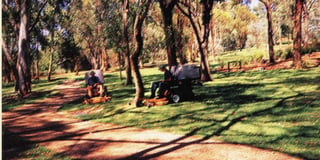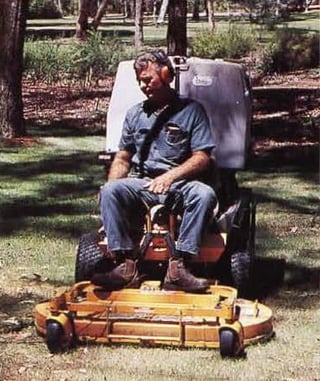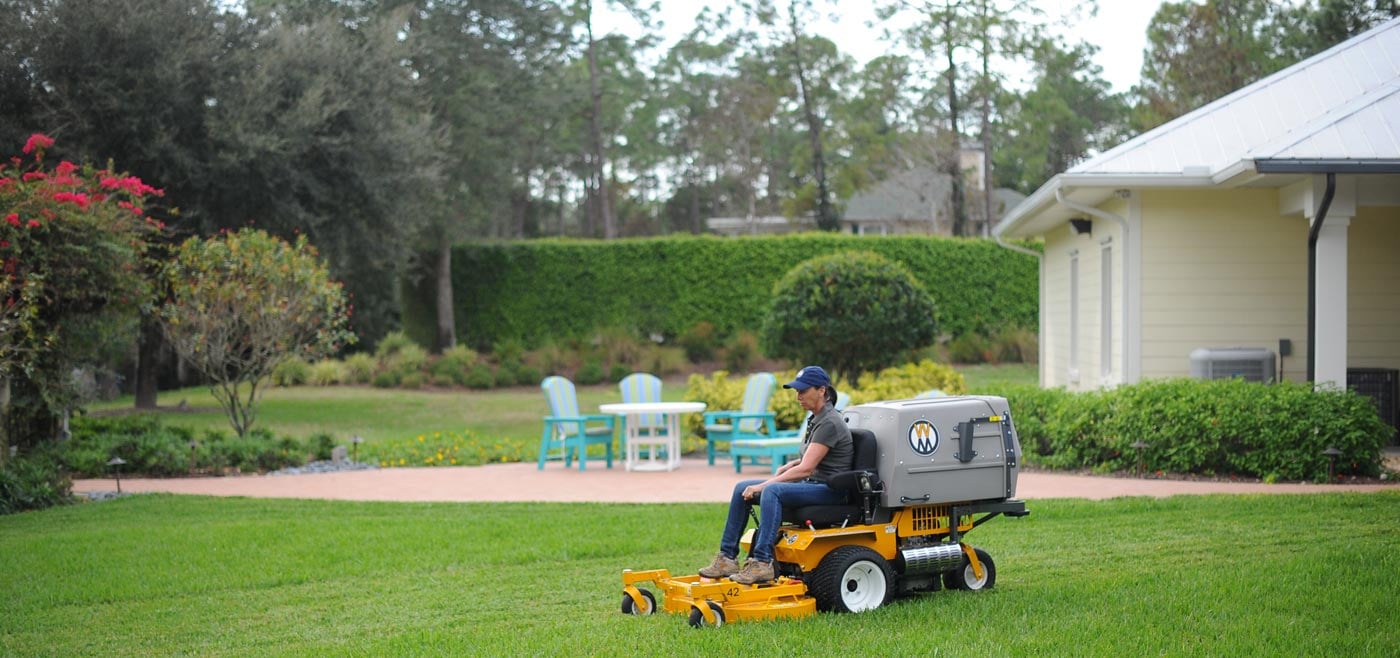The two diesel Walkers buzz in and out of the gum trees. Owen Reid's crews are precise with their turns, and they waste little time dumping the bark and grass clippings with their high-lift systems.
 "We have to be very organized in this business," tells Reid, owner of Reid's Lawnmowing in Kambah, Australia. "The overhead here is incredible. The labor rate is high, around $10 per hour, equipment is expensive, and the mowing conditions are tough."
"We have to be very organized in this business," tells Reid, owner of Reid's Lawnmowing in Kambah, Australia. "The overhead here is incredible. The labor rate is high, around $10 per hour, equipment is expensive, and the mowing conditions are tough."
A former police officer, Reid started mowing lawns in 1989. Five years later he went full-time in the business, expanding his services to include just about anything and everything a customer could want. Today, he operates with four full-time employees, and services both corporate and commercial accounts, and a handful of residential properties.
Located about 20 minutes outside of Canberra, Australia's capital, Reid's company finds plenty of work in a city that is growing and privatizing at the same time. In the last 18 months alone, his company has doubled in size and it's still expanding, he emphasizes.
No, finding work isn't a challenge in Canberra and its surrounding suburbs. But making money can be. That's where the Walkers come in.
Reid bought his first Walker, a used model, in 1993. He has since purchased two diesel units equipped with 42- and 48-inch grass-handling decks, as well as 52- and 62-inch side-discharge decks. He says he went with diesel because they last a long time and are more economical on fuel than their petrol counterparts. Their value, however, comes through loud and clear at the Canberra Botanical Gardens where the mower's maneuverability and pick-up capability are put to a rugged test.
"The real reason we went with these mowers is because they allow us to do the jobs more efficiently, and they do a better job mowing than other machines," tells Reid. "They are compact, maneuverable, and they clean up so well. If we can fit a Walker on a property, we'll use it."
Even the botanical garden has commented on the look of the property since Reid's been maintaining it.
As he observes his crew members mowing the property, Reid points out how close they get to the trees. Touching or in anyway injuring a tree is something to be avoided on any property, but in the botanical garden, it's not even an option.
He also points out the leaf and bark material that seem to constantly shed from any of more than dozens of varieties of gum trees at the garden. "You need a mower here that can really pick up debris," he emphasizes.
Reid compares the mowing conditions in Australia to the United States where he visited last year.
"The biggest difference is the lack of irrigation used over here," he notes. "Irrigation is just too expensive for most properties. Unfortunately, turf that isn't irrigated is tougher on decks than turf that is because of the dust and dirt."
Lawns are mowed much shorter in Australia, he adds, which puts additional stress on the mowing deck and the ability of the machine to pick up the clippings.
Another comparison? "They just seem to do more mowing in the United States, says Reid, using roadsides as a reference which are usually left unattended in Australia. Additionally, contractors employ a lot of intermediate walk-behind mowers, something Reid says never caught on in his country. As he puts it, "Why walk when you can ride."
Competitively Speaking
One thing that is the same both "down under" and in the United States is the competitive nature of the grounds maintenance industry. Both countries have their share of price cutters. Also in both countries, offering more (e.g., providing full service) is becoming one way to set yourself apart from the competition.
Reid's Lawnmowing is really a misnomer. In reality, Reid's crews also care for gardens and landscape, remove rubbish and do minor landscaping. ''We'll even change light bulbs and do some interior cleaning if customers asks," says the owner.
Most of his customers are on yearly contracts, except for the botanical garden which has signed up for three years. The company charges approximately $35 per hour for its maintenance services, and has to run a tight ship to make that figure a profitable one.
In addition to the equipment and labor overhead, Reid's Lawnmowing also carries a $5 million public liability insurance policy and workers' compensation. And 5% comes out of employee wages for retirement.
 "Smaller operators like myself really have to keep their minds on the business end of things to remain profitable," tells Reid. He takes his equipment to local Walker dealer D & R Hanns for weekly service and maintenance. "In the long run, it works out for us," he explains.
"Smaller operators like myself really have to keep their minds on the business end of things to remain profitable," tells Reid. He takes his equipment to local Walker dealer D & R Hanns for weekly service and maintenance. "In the long run, it works out for us," he explains.
You'll find the owner on a mower, too. And all of his equipment is top of the line, including his Honda push mowers, Shindaiwa weed trimmers and Taro vacuums.
Even his trailer is something special, custom built to hold two Walkers with big decks, and with convenient features such as a trimmer trap and blower box.
No, mowing in Australia is not like mowing in the United States. Conditions seem a bit more harsh and the overhead seems a bit steeper.
Yet, when all is said and done, the bottom line is the same - get the job done in the most efficient way possible and deliver the best service possible.




 Site Search
Site Search



